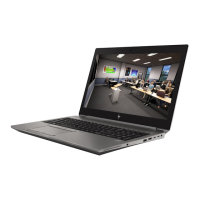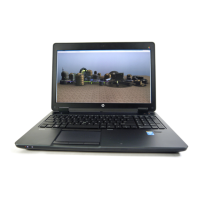All display panel defects should be examined at the highest possible resolution using both the brightest and
darkest possible backgrounds, because some subpixel failures might not be readily visible under certain
conditions.
● Type 1: Bright dot on a dark background = Always On
● Type 2: Dark dot on a bright background = Always O
● Combination = in any combination and any color that are always on or o
Use the HP PC Hardware Diagnostics (UEFI) tool to determine numbers of pixels and their distance. HP uses the
following set of criteria when damaged displays are submitted for warranty coverage.
Source: http://support.hp.com/us-en/document/c00035844
Table 7-56 Electrical defect criteria
Panel resolution Accept Reject
Subpixel faults
VGA, SVGA, SD, WSVGA, XGA, 720p, SD+, WXGA, HD N ≤ 2 Type 1
N ≤ 2 Type 2
N ≥ 3 Type 1
WXGA+, SXGA+, HD+, SXGA+ N ≤ 3 Type 1
N ≤ 3 Type 2
N ≥ 4 Type 1
WSXGA+, UXGA, FHD, WUXGA N ≤ 4 Type 1
N ≤ 4 Type 2
N ≥ 5 Type 1
QHD, QHD+, WQXGA, UD N ≤ 5 Type 1
N ≤ 5 Type 2
N ≥ 6 Type 1
Electrical defect clusters (defects within a 5x5 pixel block)
Minimum distance between ANY allowable defects (unless otherwise specied) S ≥ 25 mm S < 25 mm
Cluster with 2 or more subpixels with subpixel faults Not allowed
Dim lines Not allowed
Cross lines on/o Not allowed
Horizontal lines on/o Not allowed
Vertical lines on/o Not allowed
NOTE: Examine all LCD panel defects at the highest possible resolution using both the brightest and darkest
possible backgrounds, because some subpixel failures might not be readily visible under certain conditions.
NOTE: Contact support for assistance if issues are not listed.
Cable management
Proper routing of the internal cables is critical to the operation of the computer. Follow good cable management
practices when you have to remove and install components.
180 Chapter 7 Troubleshooting guide ENWW

